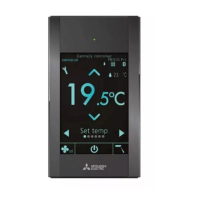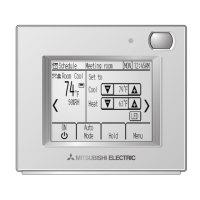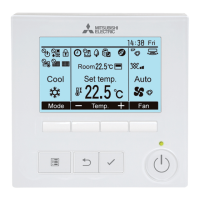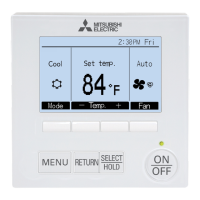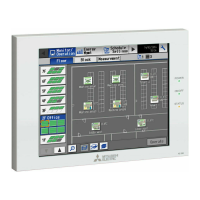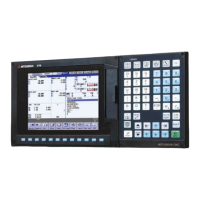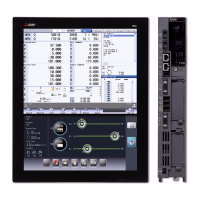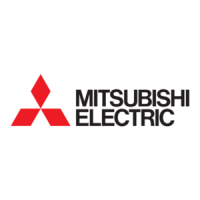
Do you have a question about the Mitsubishi Electric C80 Series and is the answer not in the manual?
| Communication Interfaces | Ethernet, USB |
|---|---|
| Power Supply | 24 VDC |
| Display | Built-in LCD display (on some models) |
| Interpolation Functions | Linear, circular |
| Series | C80 Series |
| Humidity | 90% RH or less (non-condensing) |
Important safety precautions and guidelines for using the CNC unit, including item precedence and potential function differences.
General safety precautions, including DANGER, WARNING, CAUTION levels, prohibited behaviors, and compulsory actions.
Lists manuals related to MTBs for NC systems, including IB numbers and purpose.
Lists manuals related to MTBs for drive sections, including IB numbers and contents.
Lists manuals for MTBs related to other Mitsubishi Electric products, including GOT and PLC series.
Lists reference manuals for MTBs, covering smart safety observation and communication functions.
Details on operating the GOT, including displaying the utility screen and CNC monitor2 screen.
Detailed explanation of SVGA screen elements and function window operations.
Explanation of the CNC Monitor2 screen, its display items, and key components.
Procedures for setting numerical and alphabetical characters, and inputting operations using operators and functions.
Explanation of parameter guidance and alarm guidance functions for enhanced user support.
Overview of menu configurations and basic operations using touchscreen functionality.
Details on using the software keyboard, including display, input, and view mode switching.
Explains the program editing function for adding, deleting, and changing NC memory data.
Procedures for registering and editing MDI programs, including notes and precautions.
Details on inputting, outputting, and editing fixed cycle subprograms with caution notes.
Explanation of editing operations including changing display, and managing lines and characters.
Details on performing operation search and automatically adding sequence numbers (N No.).
Functionality for creating programs by trying sample machining with manual or jog feed.
Procedures for simultaneous program editing across multiple part systems.
Details on defining common and local variables, including their usage and setting ranges.
Explains NC data input/output between internal memory and external devices using Edit screen I/O.
Methods for specifying devices, directories, and file names for transfer and erase operations.
Explains the method for transferring files between different devices or within the same device.
Method used to compare files after transferring, focusing on text files.
Procedure for erasing files from the I/O screen of the edit screen.
Method used to change the file name on the I/O screen of the edit screen.
Explains the method used to newly create a directory.
Includes functions like merging files, listing file names, and edit lock settings.
Explains how data protection keys prevent data from being set or erased.
Procedures for batch transferring machining programs between external devices and NC memory.
Procedures for backing up and restoring NC memory data using a USB drive.
Assigning tool numbers and registering tools corresponding to magazine pots and spindles.
Details on measuring tools, including tool length and radius measurements.
Setting and displaying tool compensation data, including types I, II, and III.
Setting and displaying tool life management data for M and L systems.
Procedures for setting and measuring workpiece coordinates, including surface, hole, width, and rotation measurements.
Function to shift the workpiece coordinate system via manual or automatic setting.
Displaying and setting various user parameters by part system or axis.
Selecting high-accuracy parameter sets for different machining purposes and processes.
Setting stored stroke limits to define prohibited ranges and chuck/tailstock barriers.
Displaying and setting integrated time values like date, power ON time, and automatic operation time.
Setting arbitrary values in the relative position counter and switching displayed axes.
Procedures for setting and canceling the origin for coordinate systems.
Executing S, M, T, and B commands manually via numerical input.
Displaying and editing MDI program contents in a pop-up window.
Function to store thread groove positions for enabling thread re-machining.
Calling programs from storage and executing program search based on conditions.
Monitoring axis counter, speed display, and MSTB commands on the monitor screen.
Procedures for restarting machining from a specific block after suspension.
Blocking program operation at registered collation and stop positions and canceling them.
Editing programs directly on the screen and saving changes to NC memory.
Displaying and analyzing currently occurring alarms, messages, and their history.
Verifying system configuration, option details, drive monitor, and safety observation status.
Displaying and setting PLC device data, and performing one-shot output and modal output.
Monitoring safety functions, communication status, and version information.
Methods for selecting devices, directories, and file names for backup operations.
Procedure for transferring files between different devices or NC memory.
Method to compare text files after transferring, ensuring data integrity.
Procedure for erasing files from the I/O screen of the edit screen.
Method used to change the file name on the I/O screen of the edit screen.
Explains the method used to newly create a directory.
Lists restrictions for file transfer, device definition, list display, and program name.
Includes file merging, listing file names, and data protection key functions.
Functions to prohibit editing or erasing machining programs B and C.
Explains how data protection keys prevent data from being set or erased.
Procedures for batch transferring machining programs between external devices and NC memory.
Procedures for backing up and restoring NC memory data using a USB drive.
Details on assigning feedrates using single digits following address F, including manual handle speed change.
Inspection items for GOT, criteria, corrective actions, and cleaning the liquid crystal display.


